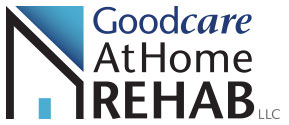When a loved one is diagnosed with dementia, Goodcare AtHome Rehab owner Jill Gabbert says she often sees family members go through the various stages of grief.
“They tend to go through a little bit of shock as they work to understand it,” she said. “And, as they try their hardest, it gets more and more difficult as the dementia progresses. They learn about dementia, but they don’t learn about it in terms of day-to-day functions.”
An occupational therapist and a Certified Dementia Capable Care Instructor, Gabbert says that it often becomes difficult for loved ones to cope with the changes they see on anything other than a personal level. This can start to have negative consequences on the relationship, and it can affect the well-being of the dementia sufferer.
That’s why the Goodcare AtHome Rehab team in Sioux Falls, Sioux City and Omaha work with dementia caregivers to help them shift their mindset from what the patient can’t do to what they can do.
Such an approach can take some of the burden off family caregivers while helping them maintain a more positive relationship with their loved one as the dementia progresses.
“How can we help make changes and modifications to the home environment to help the loved one be as successful as can be?” Gabbert said. “We can work with people from the very beginning stages of dementia, where speech therapists and occupational therapists work with them on strategies for making appointments, remembering to take pills, and so on … strategies to get them safely and successfully through their day-to-day activities.”
For dementia patients who live in senior living communities, Goodcare AtHome Rehab’s occupational and speech therapists can still work with family members and caregivers to strengthen relationships while helping the dementia patient live his or her best life.
Assisting with communication strategies, for example, is one way the therapists help family members better cope with the progression of dementia.
For example, rather than focusing conversations on what clients can’t remember (i.e., names, the day of the week, what they had for dinner), Gabbert focuses on changing the narrative to what long-term memories and activities can be used to help the client and families have an enjoyable interaction and leave feeling good about the visit, even if they don’t remember them that day.
“For the person with dementia, if the caregivers understand how to communicate with that person, the interaction is more joyful,” Gabbert said. “Once that person leaves, the resident just has a better day. They’re happier, and they’re able to get through their day with less concerns and less challenges than when a family member comes by and spends the vist asking, questions they may not remember in that moment, like, ‘Who am I?’”
As a Dementia Capable Care Instructor, Gabbert educates partners and the therapy staff on the stages of dementia, how to communicate with someone within each of these stages, and how to maximize what the patient can do.
According to Gabbert, all Goodcare AtHome Rehab occupational and speech therapists are fully trained in dementia care, allowing them to work with family and senior living community staff on identifying and addressing the specific needs of dementia patients.
The therapy team will also work with home caregivers on strategies they can use to help the dementia sufferer be more successful with everyday tasks like getting dressed and preparing meals.
According to Gabbert, caregivers should never feel they are without professional care during the dementia journey. They should begin to seek assistance once they start to see changes in their loved one that may compromise their safety.
“And, if frustration and strife start to build in the relationship, that’s when we can really help,” she said.
For more information, contact the Goodcare AtHome Rehab team at (605) 988-4528.
